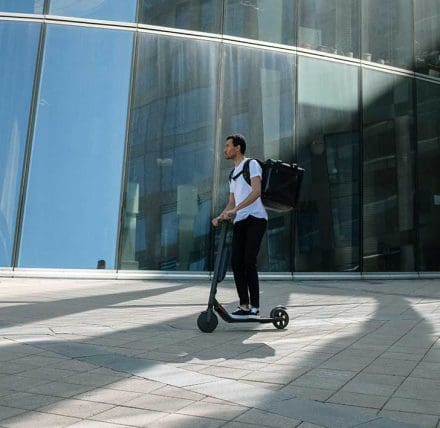


Is the rise in e-scooters an accident waiting to happen?
INSIGHTS
Electric scooters (e-scooters) continue to increase in popularity in Scotland. With that in mind, it might come as a surprise to some that it is currently illegal to operate an e-scooter on a public road or pavement in Scotland.
The UK Government introduced legislation to trial the use of e-scooter’s in public through local authorities. Rental schemes first started operating in July 2020. Since then, some areas have been removed from the trials and others have been added. There are more than 25 trials operating within the UK, the most recent starting only in May 2023. Currently, there are no trials operating in Scotland which means that it is currently not legal to operate an e-scooter anywhere in Scotland other than on private land, with the land owner’s permission. Despite this, they are not an uncommon sight in towns and cities north of the border.
The trials have been under review by the Department for Transport. In December 2022, a report on the use of e-scooters was published. The report indicated that the general consensus is that e-scooters can serve as a valuable mode of transport. The majority of users and residents in the trial areas viewed the addition of e-scooters in a positive light. As expected, some points of concern have been raised and these will be keenly monitored as the trials continue so that further guidance can be issued.
The report highlighted that during 2021 the frequency of rental e-scooter collisions was higher than with pedal cycles. E-scooter users raised concerns about the design of the vehicles. Members of the public raised concerns about the behaviour of some users – the use of the vehicles on pavements causing particular concern.
As a result of the review, some changes have already been made. E-scooters now require to have a unique identification number so that rental scooters can be differentiated from non-rental scooters and operators have been encouraged to incentivise the use of helmets (although still not currently a legal requirement to wear a helmet whilst operating an e-scooter).
Who can rent an e-scooter?
Renting an e-scooter can be easily done from a smartphone, similar to the bicycle rental schemes around UK cities.
To rent an e-scooter from an official trial, you must have a category Q entitlement on your driving licence, own a smartphone and complete an online course. There is no specific age restriction but the earliest anyone in the UK can obtain their provisional driving licence is 15 years and 9 months.
Where can I ride an e-scooter?
At present, it is illegal to ride a privately owned scooter on a public road, pavement or cycle path. If you own a privately owned e-scooter you can only ride on privately owned land with the land owner’s permission. If you are caught using a privately owned electric scooter on public land, you are liable to receive a £300 fine, six penalty points on your license, your account to hire suspended and the possibility of having your scooter seized.
There are no specific laws for e-scooters. They are recognised as “powered transporters” and are subject to the same laws and regulations as motor vehicles (including the requirements in connection with MOT certificates, tax and insurance).
This means while using a rental e-scooter you could be subject to fines and penalty points for actions reflecting the laws around driving a motor vehicle such as jumping a red light, riding on the pavement, using a mobile phone or surpassing the e-scooter speed limit.
The future of e-scooter claims
With the increase in usage, there will inevitably be an increase in the number of accidents involving e-scooters. However, what might first appear to be a straightforward road traffic accident could quickly become a complicated product liability claim involving multiple defenders under the Consumer Protection Act 1987.
Ingathering of evidence following accidents involving rental e-scooters may be more straightforward given the requirement for unique identification numbers and in-built motor insurance arranged by the operator. Where an accident occurs on private land, with a private e-scooter operator, the identity of the operator may be more difficult to confirm. Careful consideration of the accident circumstances and ingathering of evidence as soon as possible after a collision has occurred will be crucial to the success of claims involving e-scooters.
If you’re looking for legal advice in relation to e-scooters or have been involved in an accident as a result of someone else’s negligence please don’t hesitate to get in touch.
About the author
Senior Solicitor
RELATED
CONTACT US
Call us for free on 0330 912 0294 or complete our online form below for legal advice or to arrange a call back.